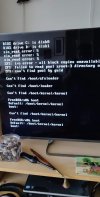For no particular reason that I can identify, my FreeBSD desktop PC (13.0) has started printing out an unending stream of
I could post a video of the problem, but as no sign of the error seems to exist once the kernel actually starts, I'm not sure what other details I can offer at this time. The installation is zfs-on-root, though I don't think there's anything out of the ordinary about that.
zio_read error: 5 messages on boot. The boot still finished correctly, and the messages stop once I reach the point where the actual kernel is starting up (i.e. the start of the dmesg history), but before that, while I'm in the bootloader, the stream of error messages makes it basically impossible to actually see the bootloader menu (I see it fly by, but it gets pushed off the page by the error messages in under a second). Does anybody recognize those symptoms or have a suggestion re: how to fix?I could post a video of the problem, but as no sign of the error seems to exist once the kernel actually starts, I'm not sure what other details I can offer at this time. The installation is zfs-on-root, though I don't think there's anything out of the ordinary about that.

